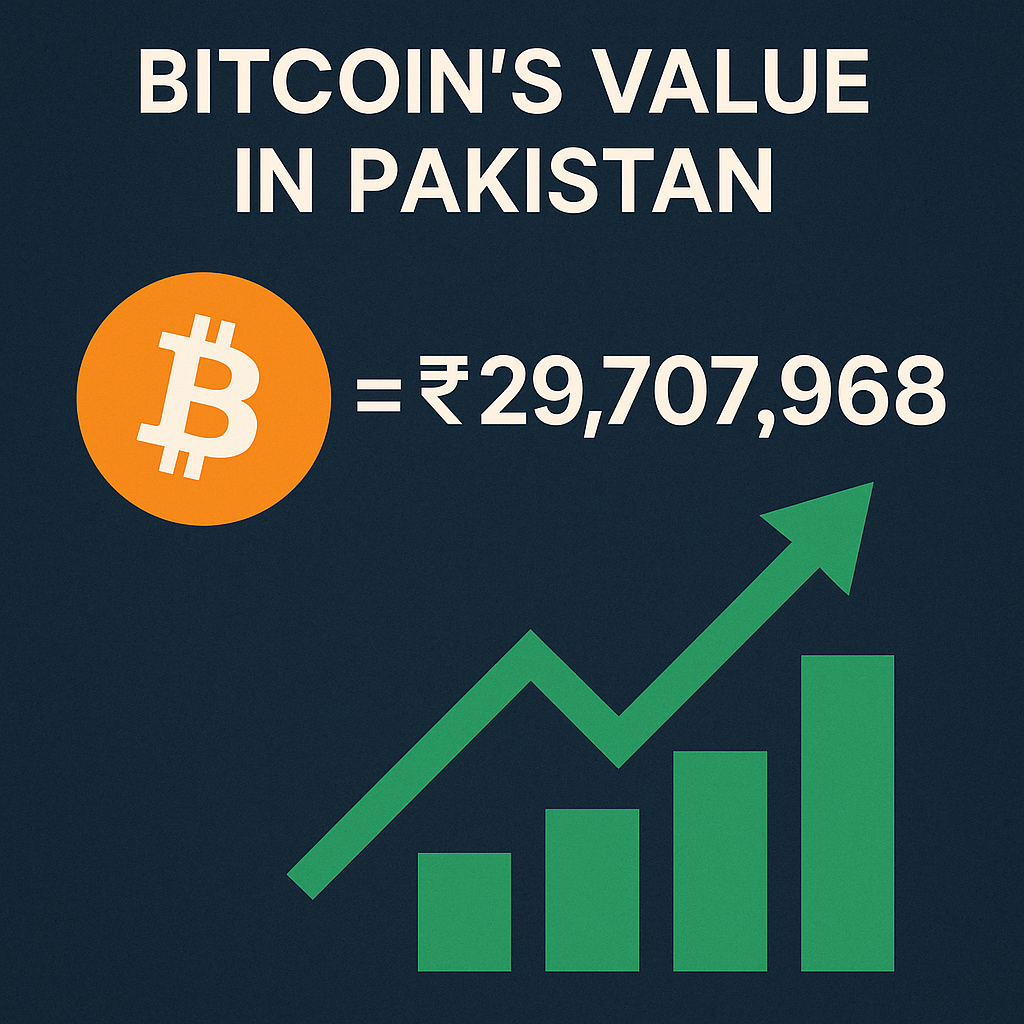Over the past decade, Bitcoin (BTC) has transitioned from a niche digital curiosity to a mainstream asset class, and its appeal in Pakistan has grown markedly. Faced with a depreciating Pakistani rupee (PKR), capital controls, and high remittance fees, many Pakistanis view BTC as both a hedge and a convenient cross-border transfer medium. This article examines Bitcoin’s current valuation in PKR, traces its historical price evolution, explores demand drivers, highlights trading venues, deciphers the regulatory environment, and evaluates future prospects in Pakistan’s unique economic landscape.
1. Current Bitcoin Price in PKR
As of May 20, 2025, one Bitcoin is trading at approximately ₨ 29,707,968 on CoinGecko’s PKR converter—up roughly 0.3% over the past 24 hours and 1.3% week-to-date CoinGecko. Binance’s BTC-pegged token (BTCB) shows a very similar PKR rate at ₨ 29,722,810, underscoring minimal arbitrage between major platforms CoinGecko.
2. Historical Trends and Price Evolution
Since its first recorded trade in PKR in 2013 (near ₨ 1,500 per BTC), Bitcoin’s rupee value has surged by over 19,000×. The rupee’s chronic inflation—averaging around 9–12% annually—has amplified Bitcoin’s PKR gains, especially during global bull markets in 2017 and 2021. Local peaks (like ₨ 12 million in April 2021) coincided with global all-time highs, while steep corrections mirrored global downturns. Overall, Bitcoin’s ascent in PKR has outpaced most traditional asset returns, making it an attractive, albeit volatile, store of value.
3. Factors Driving Bitcoin Demand in Pakistan
- Rupee Depreciation: The PKR has lost over 45% of its value against the U.S. dollar since 2018. Investors seeking to preserve savings often turn to BTC, which has outperformed the rupee across multiple time horizons.
- Remittances: Overseas Pakistanis send home more than $26 billion annually, and high banking fees (3–5% of transfer value) prompt many to switch to peer-to-peer (P2P) crypto channels, saving on costs and transfer times.
- Global Market Cycles: As part of a 24/7 global market, BTC price movements in New York or Singapore instantly affect Pakistani traders, fueling rapid local buying during bullish phases.
4. Trading Venues and Accessibility
- Centralized Exchanges (CEXs)
- Binance P2P: Offers PKR trades with escrow protection and competitive rates.
- OKX & Crypto.com: Provide fiat-on ramps via local partners.
- Binance P2P: Offers PKR trades with escrow protection and competitive rates.
- Local Peer-to-Peer (P2P) Platforms
- LocalBitcoins & Urdubit: Facilitate direct PKR-BTC trades, often at slight premiums during high demand.
- LocalBitcoins & Urdubit: Facilitate direct PKR-BTC trades, often at slight premiums during high demand.
- Over-the-Counter (OTC) Desks
- For large transactions (>₨ 5 million), OTC services offer bespoke pricing, reduced slippage, and enhanced privacy.
- For large transactions (>₨ 5 million), OTC services offer bespoke pricing, reduced slippage, and enhanced privacy.
5. Regulatory Landscape
- SBP Caution (2018): The State Bank of Pakistan (SBP) issued a public notice warning that virtual currencies are neither legal tender nor authorized by any Pakistani authority, cautioning banks and the public about associated risks State Bank of PakistanState Bank of Pakistan.
- Pakistan Crypto Council (March 2025): The Finance Ministry launched the Pakistan Crypto Council (PCC) to draft a regulatory framework and foster blockchain innovation. Chaired by Finance Minister Aurangzeb and advised by Binance founder Changpeng Zhao, the PCC aims to legitimize crypto activities while balancing consumer protection and technological growth Crypto Council for InnovationBinance.
- Taxation & Compliance: Crypto gains are not yet explicitly taxed under Pakistan’s Income Tax Ordinance. The Federal Board of Revenue is evaluating models, potentially taxing capital gains over holding-period thresholds or subjecting profits to a flat crypto-specific levy.
6. Use Cases and Adoption
- Remittance Efficiency: P2P BTC transfers reduce fees to below 1%, cut settlement times from days to minutes, and bypass FX volatility risks.
- Investment & Speculation: High-net-worth individuals and retail traders allocate 2–5% of portfolios to BTC for diversification, eyeing both capital appreciation and inflation hedging.
- Energy-Driven Mining: Leveraging solar and hydropower surpluses, the PCC is courting mining firms to set up in areas with excess grid capacity, aiming to repurpose idle electricity and earn crypto income ReutersBitcoin Magazine.
7. Risks and Challenges
- Price Volatility: Intraday swings can exceed 5–10%, risking significant losses for margin traders or short-term speculators.
- Legal Ambiguity: Without formal legal tender status, crypto businesses face uncertain licensing, while users lack clear recourse in disputes.
- Security Threats: Phishing, exchange hacks, and wallet vulnerabilities underscore the need for hardware wallets and rigorous operational security.
8. Future Outlook
- Regulatory Sandboxes: The PCC plans pilot programs for licensed exchanges and remittance providers, expected to launch H2 2025. These sandboxes will test KYC/AML protocols and consumer-protection measures before nationwide rollouts.
- Infrastructure Expansion: Collaboration with telecom firms could integrate crypto payments into mobile wallets, widening access in underbanked regions.
- Energy & Mining Ecosystem: Formalizing power-sale agreements between state utilities and mining operators could stabilize electricity grids and foster ancillary AI/data-center hubs.
Conclusion
In Pakistan, Bitcoin’s PKR valuation— hovering near ₨ 29.7 million per BTC—reflects both global crypto cycles and local economic pressures. As PKR devaluation and high remittance costs persist, BTC adoption is poised to grow. The establishment of the Pakistan Crypto Council signals a willingness to regulate and integrate crypto, potentially ushering in clearer tax regimes, licensed trading venues, and energy-efficient mining initiatives. However, volatility, legal uncertainties, and security risks remain headwinds. For Pakistani investors and innovators, staying abreast of price trends, regulatory developments, and best-practice custody solutions will be crucial to harnessing Bitcoin’s potential in the years ahead.
